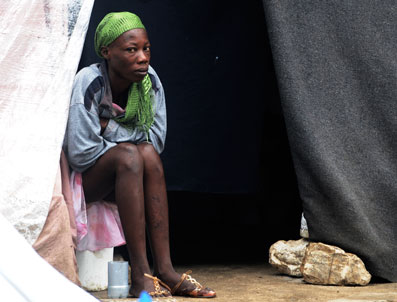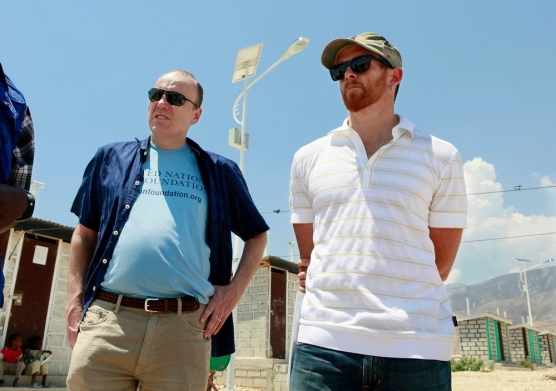
Nursing and midwifery students crowd around to observe as midwives help a woman deliver a baby. (Photo: Jenny Asarnow)
Erin Curtiss is a midwife in Seattle. She is 34 years old, has sharp blue eyes and a raunchy sense of humor. She lives with her two young sons and her girlfriend.
Erin, who runs her own home birth business, recently learned of an American nonprofit organization called Midwives for Haiti. She found it on Facebook.
…
She traveled to a little city called Hinche, in Haiti’s Central Plateau. She came to volunteer at the public hospital, where patients are crammed into long rooms with no electricity, and where the windows and doors are open to the air – and the mosquitoes and flies and lizards that come through.
Back home, Erin only deals with uncomplicated pregnancies, but here, women have extremely high blood pressure, anemia, even cholera. These are the sickest patients she has ever seen, and the hospital staff doesn’t seem to have enough time for anyone.
Erin came here mostly to train midwives, but now that she sees how much needs to get done, she wants to do more. So she makes a generous offer. She’ll work the night shift, when there are fewer midwives on staff.
Night at the Hospital“There’s really so much that doesn’t get done here, so I think there’s plenty to get done tonight,” Erin says as she arrives around 9 p.m.
The maternity ward is completely full. Families crowd the spaces between beds and listen to their radios. Thirty-three women are about to give birth or just did, and there are only two nurse-midwives on duty: Adeline and Denise. Adeline and Denise are graduates of Midwives for Haiti’s training program. They both smile, but they look strained. Adeline says this is their seventh night working. She hasn’t slept in a week. “God sent you,” she says with a laugh.
Erin and the Haitian midwives deliver a baby. Then Erin checks on the sickest patients.
Around midnight, Erin gives medicine to a woman with dangerously high blood pressure, but it’s not working, and she doesn’t know what else to do. “I’m almost to the end of the syringe full of meds,” she says. “When it’s done, I’m going to tell the midwife that it didn’t work.”
But the Haitian midwives are nowhere to be found. They’re asleep in the labor and delivery room. They lay down sometime before midnight. Erin realizes she’s on her own.
The hospital is dark. A bunch of young men are standing in the courtyard. A lizard runs up the wall. Dogs turn over trashcans.
Erin goes to check on her patient. As she switches on her headlamp, the light illuminates a bucket – a chamber pot – beside another woman’s bed.
“There’s a lot of blood in that bucket,” Erin says with a gasp. This woman is hemorrhaging. It’s one of the reasons so many pregnant women here die.The woman’s voice is faint. She says she gave birth six hours ago – just before Erin arrived. She may have been bleeding that whole time.
“Her uterus is full of blood and probably has clots in there,” Erin says. “I’m going to need to get them out.”
Erin tries to stop the bleeding, but she’s worried. She is also frustrated – that Adeline and Denise are asleep.
“You would think that there would be some kind of protocol set up for every two hours, somebody does a round,” she commented later. “And as far as I could tell, that wasn’t happening at all. Here are people who are trusting you to help them, and you’ve abandoned them.”
It’s not until after 4 a.m. that the Haitian midwives finally wake up. Erin gets the woman’s bleeding under control, but when she leaves the hospital at 6, she is still on edge.
“That was positively horrible,” she says. She realizes that her Haitian colleagues are overworked and need sleep, but she can’t understand why Adeline and Denise didn’t check on their patients, especially the woman who hemorrhaged.Hard Truths
A few days later, after Erin has gone back to Seattle, the Haitian midwives explain what happened that night.
Denise and Adeline say one of the reasons they slept is simple: they were exhausted. But there’s another reason they don’t check on the patients at night. They’re scared to go into the courtyard where the patients’ rooms are.
“We are women, so we can’t go out of the labor and delivery room to check on the patients,” Adeline says through an interpreter.
“Haiti is a dangerous country,” she continues. “We don’t have light in the rooms. Even if you had a flashlight, you’re two women. After midnight or 1 a.m. you can’t check on the sick because of the lack of security.” Adeline and Denise say not long ago a girl was raped in the hospital at night.In a place where women desperately need midwives, these midwives can’t do their job right because they don’t feel safe.
Sexual violence is a huge issue in Haiti, often called the rape epidemic and one cause is the lack of electricity which prevents a more safer lighting of certain areas. The World Policy Institute released an article about the rape epidemic and it states:
When you ask what will prevent rape in Haiti’s camps, people usually say two things: lights and security. A flood light, one aid worker says, is as good as 40 policemen.
But even where lights exist, electricity in Haiti is unreliable, and camps must run generators to keep the lights on overnight. On a recent visit, one American non-profit found plenty of lights in the Place Sainte-Anne camp, in the heart of Port-au-Prince, but the camp managers had no fuel to keep them running. The U.N., Sian Evans says, has helped erect at least 125 lights in camps over the past year. It’s a start, but there are 1,150 recognized relief camps in and around the capital, and this number does not include the smaller, informal groupings of tents in the medians of roads, between buildings and in backyards. Other initiatives focus on training camp managers, police and grassroots organizations on how to deal sensitively with gender-based violence and how to shepherd women through the medical and legal system.
Earlier this year, Dave “Phoenix” Farrell, bassist of Linkin Park, visited Haiti to find out how solar lights increase the safety for girls and women.
Today, Dave “Phoenix” Farrell, a member of the two-time Grammy winning, multiplatinum band Linkin Park, returned from a trip to Haiti with the United Nations Foundation to see firsthand how the United Nations is helping Haiti rebuild, fifteen months after a major earthquake killed hundreds of thousands and destroyed much of the nation’s infrastructure. Among the many hardships facing Haitian women is the threat of sexual violence and intimidation. While in Haiti, Phoenix met with UN staff and Haitians to learn how something as simple as solar street lights are protecting women and children from violence at night in the camps, and how their charity Music for Relief has already helped to protect thousands.
…
Over the past months, 200 cost-efficient, environmentally friendly and durable LED streetlights have been installed by the UN’s Population Fund with the guidance of Haitian women. The lamps, provided with support from the UN Foundation, Music for Relief, and USAID, are already leading to a reduction of violent incidents. In addition, regular patrols by the United Nations Stabilization Mission in Haiti (MINUSTAH) and the Haitian police are helping to reign in crime.
Help Power the World to raise awareness and provide girls and women with the security they need!



No Replies to ""Power the World" Week - Issue #2: The Rape Epidemic or Hard Lessons for US Midwife in Haiti"